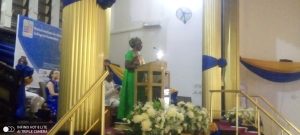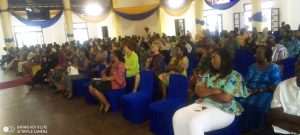ANTON WILHELM AMO LECTURE AT GREAT HALL DURING LAUNCH

ANTON WILHELM AMO LECTURE AT GREAT HALL DURING LAUNCH
The world lives with the falsehood that on planet earth, there’s one universal correct way of being human, i.e., the western way of thinking, of being and of doing, which is constructed as a one size fits all model, the ” default drive” for the entire world.
Theme: Decolonizing knowledge production in Africa
She said the lecture focuses on some of the ways that this falsehood is constructed and sustained, focusing on its implications for Africa.
It highlights some of the mechanism and spread across the continent.
The Maria Sibylla Merian Institute for Advanced Studies in Africa (MIASA) is dedicated to the topic of ‘Sustainable Governance’.
According to her Professor, Sylvia Tamale, Makerere University, said, Governance we define as the interplay of informal and formal rules for steering public affairs, embedded in social, material and cultural practices of everyday life.
She said, MIASA’s three research foci are: sustainable environmental transformation, sustainable conflict management, and sustainable democracy.
Overarching aims of MIASA are working towards a reduction of global asymmetries in knowledge production and bridging the cultural divide between anglophone and francophone Africa.
She added that, MIASA will serve as a hub for exchange, networking and collaboration amongst leading researchers from Germany, Ghana, the African and European continent and beyond. It will also offer ample funding opportunities for early career researchers.
MIASA is based on the beautiful campus of the University of Ghana, Legon (Accra). It is the first Institute for Advanced Studies in Sub-Saharan Africa outside of South Africa. MIASA’s programmes are funded by the German Federal Ministry of Education and Research. 
She also added that, while its local staffing, administrative and operational costs are borne by the University of Ghana. After having been successfully evaluated by an international committee for its achievements during the preliminary phase.
MIASA will now receive German funding on an even more substantial scale for another six years.





